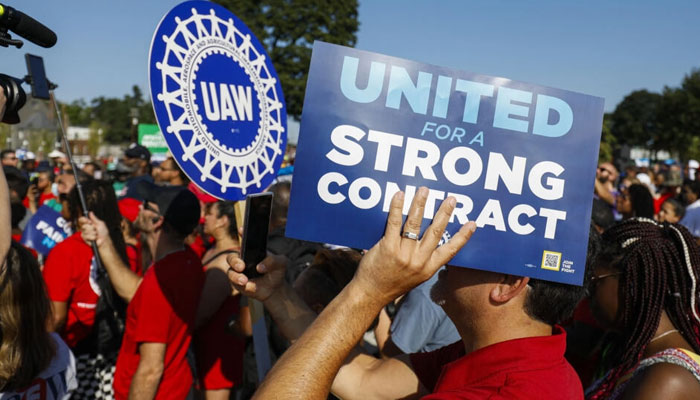Ford and GM offer 20% pay raise in bid to avoid massive UAW strike
As the UAW strike deadline draws near, all parties involved are facing a critical crossroads in the labour battle
With the United Auto Workers (UAW) strike deadline looming, General Motors (GM) and Ford have revised their contract offers, proposing a 20% wage increase for American autoworkers, a move aimed at averting a potential strike scheduled to begin if no agreement is reached by 11:59pm.
The negotiations have far-reaching implications for the US auto industry and its workers.
General Motors (GM) and Ford are in the midst of intense negotiations with the United Auto Workers (UAW) as the strike deadline approaches. Both automakers have increased their wage hike offers to 20%. GM CEO Mary Barra highlighted the urgency of reaching an agreement to avoid a strike similar to the one that occurred in 2019.
The UAW has put forward a set of demands, including the reinstatement of defined benefit pensions, shorter work weeks, cost-of-living adjustments, job security guarantees, and an end to the use of temporary workers. However, automakers argue that these demands are financially unfeasible.
A strike of this magnitude could have significant consequences for the US economy, particularly concerning the auto sector, which employs nearly one million people, including parts manufacturers. There are concerns that the strikes, if prolonged, could impact US economic growth.
UAW President Shawn Fain has criticised automakers for rejecting some of the key demands, including pension reinstatement and 32-hour work weeks, and also expressed concern about proposed changes to profit-sharing arrangements.
Ford and GM argue that the UAW's demands are unrealistic and unaffordable. For instance, Ford has pointed out that implementing these demands would have resulted in substantial losses over the past four years.
The UAW has outlined a strategy of targeted work stoppages at individual auto plants if agreements are not reached, offering negotiators maximum flexibility. The approach is aimed at securing an agreement that meets the needs of autoworkers.
The outcome of these negotiations will have a significant impact on the US auto industry and its future direction. As the strike deadline draws near, all parties involved are facing a critical crossroads in the labour battle.
-
$44 billion Bitcoin blunder: Bithumb exchange apologizes for accidental payout
-
Global memory chip crunch puts spotlight on Apple; Will iPhone become more pricey?
-
Bitcoin plummets toward $60,000 as investors dump risky bets
-
Bitcoin crashes below $63K as regulatory pressure and market fears grow
-
Bitwise Crypto Industry innovators ETF: What investors should do in 2026?
-
Nintendo shares slide again as momentum fears grow
-
Gold, silver prices fallen sharply; What’s driving the drop?
-
Gold’s record climb: Experts question if its safety is ‘overstated’












